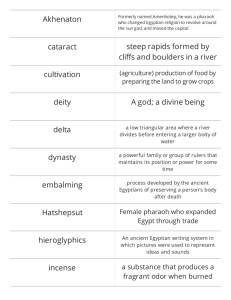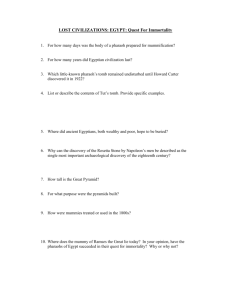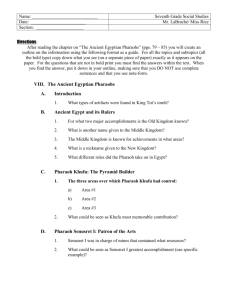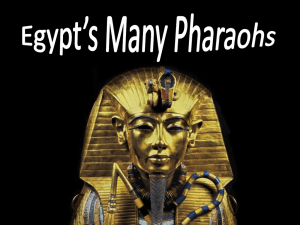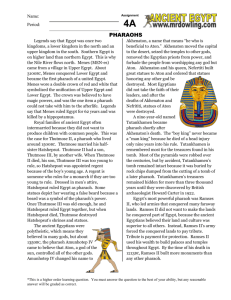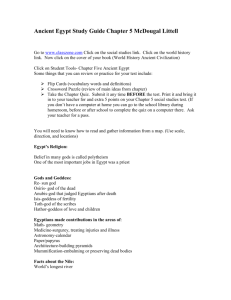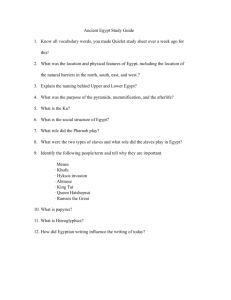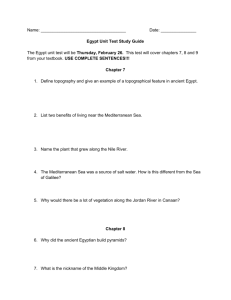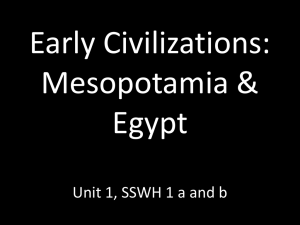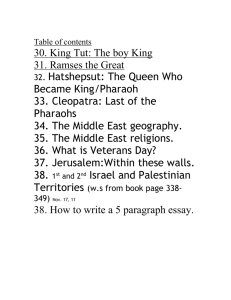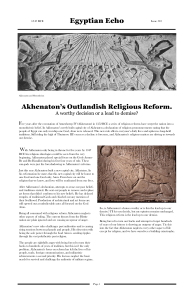Chapter 5 - Lesson 4 The New Kingdom
advertisement
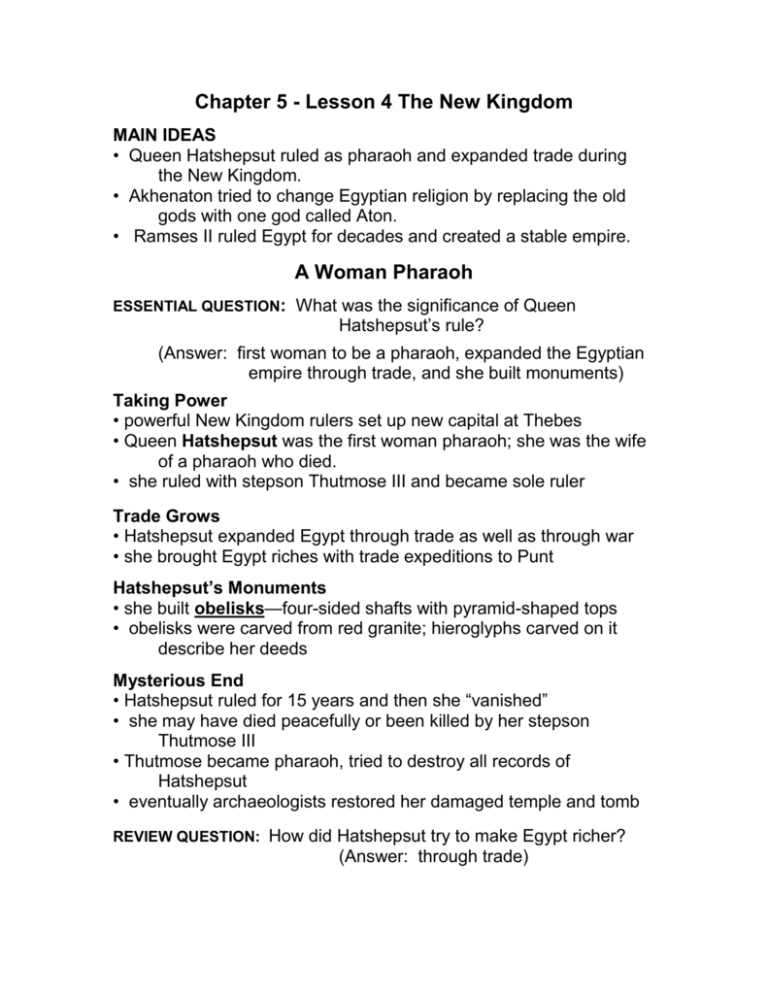
Chapter 5 - Lesson 4 The New Kingdom MAIN IDEAS • Queen Hatshepsut ruled as pharaoh and expanded trade during the New Kingdom. • Akhenaton tried to change Egyptian religion by replacing the old gods with one god called Aton. • Ramses II ruled Egypt for decades and created a stable empire. A Woman Pharaoh ESSENTIAL QUESTION: What was the significance of Queen Hatshepsut’s rule? (Answer: first woman to be a pharaoh, expanded the Egyptian empire through trade, and she built monuments) Taking Power • powerful New Kingdom rulers set up new capital at Thebes • Queen Hatshepsut was the first woman pharaoh; she was the wife of a pharaoh who died. • she ruled with stepson Thutmose III and became sole ruler Trade Grows • Hatshepsut expanded Egypt through trade as well as through war • she brought Egypt riches with trade expeditions to Punt Hatshepsut’s Monuments • she built obelisks—four-sided shafts with pyramid-shaped tops • obelisks were carved from red granite; hieroglyphs carved on it describe her deeds Mysterious End • Hatshepsut ruled for 15 years and then she “vanished” • she may have died peacefully or been killed by her stepson Thutmose III • Thutmose became pharaoh, tried to destroy all records of Hatshepsut • eventually archaeologists restored her damaged temple and tomb REVIEW QUESTION: How did Hatshepsut try to make Egypt richer? (Answer: through trade) A Reforming Pharaoh ESSENTIAL QUESTION How did Akhenaton try to change Egyptian religion? (Answer: he wanted to replace the many Egyptian gods / goddesses with just ONE god) A New Belief • Akhenaton became pharaoh in 1353 B.C. • he raised the sun god Aton to highest status and he closed other godsʼ temples • for the first time in Egyptʼs history, Egyptians worshiped one god • priests serving other gods lost power and became angry • to avoid conflict, Akhenaton moved capital 200 miles away • new capital city was called Akhenaton Realistic Art • Under Akhenaton, art showed realistic pharaohs, not “perfect” Reform Ends • Akhenaton’s new religion didn’t last long after his death • three years later, young Tutankhamen became pharaoh • the young boy king had advisers to help him rule Egypt • advisors convinced Tutankhamen to reject new religion, worship old gods REVIEW QUESTION: What reforms did Akhenaton make? (Answer: replaced worship of old gods with that of the sun god, Aton; he also had artists create realistic works of art) A Powerful Pharaoh ESSENTIAL QUESTION : How did Ramses II expand Egypt? (Answer: through conquest and a peace treaty) Ramses II • Ramses II ruled in 1279 B.C., 44 years after Tutankhamen died Empire Builder • Wanted to make Egypt powerful through war • extended territory south into Nubia & to eastern Mediterranean area Military Leader • Ramses led army against old Egyptian enemies, the Hittites • nobody won battle, but Ramses claimed victory • negotiated first-known peace treaty with Hittites Ramses’ Reign • he built a city called “House of Ramses” with four 66-foot statues of himself • he wanted to appear godlike • he ruled until age 90 • his 66-year reign was among history’s longest • he stabilized government • his reign was time of peace—no enemies after Hittite treaty • the Nile flooding was predictable during reign, crops were plentiful Egypt’s Decline • following Ramsesʼ death, the central government weakened • after about 1070 B.C., a series of foreign powers ruled Egypt • Alexander the Great of Macedonia conquered Egypt - Macedonians ruled after Alexander’s death - last Macedonian ruler was queen Cleopatra • eventually Roman Empire conquered Egypt REVIEW QUESTION: What were Ramses II’s accomplishments? (Answer: First peace treaty, extended Egypt’s territory, built monuments of himself, lived long and kept Egypt at peace during his reign.) Lesson Summary • Hatshepsut was the first woman to rule as pharaoh. She expanded Egyptʼs trade with other lands. • Akhenaton tried to change Egyptʼs religion to a belief in one god, but his religion did not last after his death. • Ramses II built an extensive empire and ruled for 66 years. His reign was a time of peace and prosperity. Why It Matters Now . . . The ancient Egyptians rejected Akhenaton’s idea of one supreme god, but that idea later became widespread. Today, many people believe in religions based one single god.
